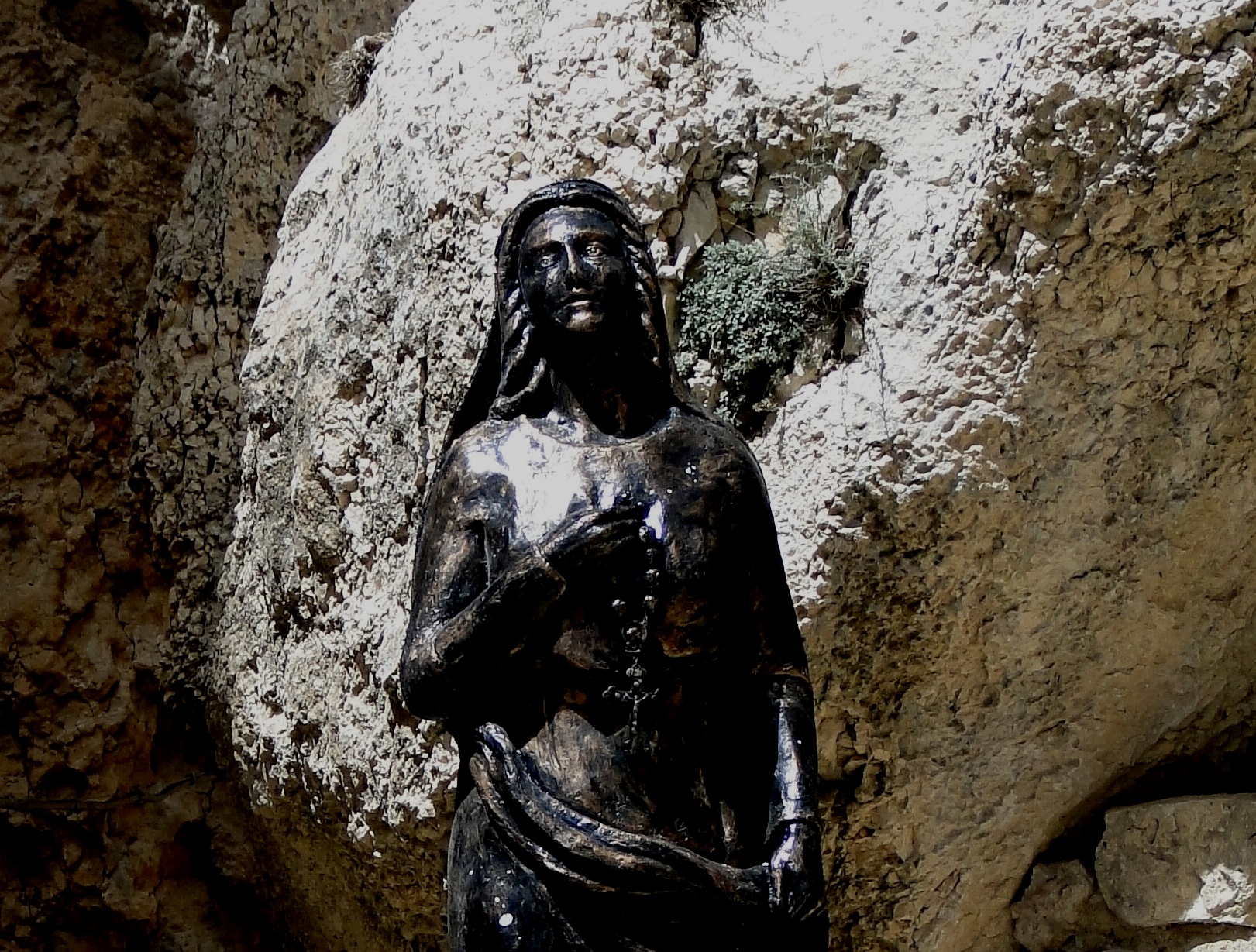The Church and the Mission of Jesus
Photograph: Photo credit: Patrizia Solizani, Creative Commons.
Introduction
This page explores many of the issues related to the church and Jesus’ mission (Matthew 28:18 - 20): biblical foundation and shape of Christian mission; the interaction between culture, language, and mission; the importance of mission in Christian spiritual formation and church life; and the history of Christian mission.
Messages and Resources on the Church and the Mission of Jesus
Christian Mission: Imperialistic? Authentically Jewish? Am I Called to Do It?
Text and slides of a message on Isaiah 2:1 - 4. Because the Hebrew Scriptures themselves — especially in the poetic hopes of Isaiah — longed for a messianic movement in which people would be called into the reign of the heir of David, it is fundamentally Jewish to hope for good to triumph over evil, and for that hope to be expressed in a meaningful community with leadership. The Christian movement in its origins fulfilled that hope, and was parodied and damaged by imitations.
Jesus' Mission: Being Light in Darkness
Text of a message on Ephesians 5:8 - 14. This message explores inspirational motivations for, and the practical how-to’s, on how to live as “light in darkness.”
Christian Spiritual Development Based on the Gospels: A Diagram
Slides to a presentation using the Great Commission in Matthew 28:16 - 20 as the focal point for Jesus’ training of the disciples throughout the Gospel of Matthew.
Athanasius as Evangelist: God Haunts Us Through Our Own Words
The Anastasis Center blog, Jan 22, 2018. A 10 minute read. God reminds us that we are moral agents in a framework larger than ourselves, through words like good and evil, justice and injustice, love and selfishness, etc. which are morally “larger” than us. This post reflects on God’s use of language in Genesis 1 - 2 and a short passage from Athanasius’ Discourse Against the Arians 2.
This video is part 11 of our series on The Theology of J.R.R. Tolkien’s The Lord of the Rings. It shows how the noble pagan search for virtue ethics was a precursor to Christian love, hope, and faith. The Hobbits grow in love: from mere loyalty to the Shire to sacrificial love for all. Eowyn grows in hope: from hoping for a glorious death in battle to hoping that life and love will outlast death and violence. Finrod, and perhaps Andreth too, grow in faith: to believe that Eru must enter into Arda to heal the Marring.
00:06:43 Pippin and Merry Grow in Love
00:27:00 Eowyn Grows in Hope
00:40:49 Finrod and Andreth Grow in Faith in Eru
01:27:40 How Do We Know?
The Council of Nicaea, the Origin of "the Trinity," and the Limitations of Human Language
Slides to a presentation on the linguistic, theological dimension of language which made the Nicene Creed both possible and necessary. This exemplifies the need for the Church to standardize its own language, to stabilize the meaning of key words, and to take an active interest in the work of translation. Prior to the debates about the Trinity, Greek and Latin had no words to express “person” as an eternal reality. The Greek prosopon and the Latin persona, were words used in the theater for the masks worn by actors. They were temporary, which was reinforced by various philosophies insisting that our human lives on this earth were temporary.
The Role of Language and Community in Spiritual Formation, in Plato and Jesus
This paper — written for Dr. Evie Holmberg's class on Greek from Plato to the Greek Fathers at Holy Cross Greek Orthodox Seminary in Fall 2018 — examines the communal contextuality of language, as well as the relationship between kataphatic and apophatic language. Part of its original purpose is to argue against a synthesis between Christian theology and Neo-Platonic philosophical paganism, despite the similarities in terms. This observation can become an argument for the simultaneity of church and Scripture on linguistic-historical grounds (because Jesus himself used human language in particular ways), but the priority of church over Scripture on linguistic-philological grounds. The paper also serves to illustrate how an apophatic approach to language does not negate kataphatic language, as analogical language does not collapse into equivocation.
Paul's View of Headship in Marriage: How 1 Corinthians Interprets Ephesians and Colossians
The word “head” (Greek kephale) has stirred up much interest and controversy because of the way it is used in husband-wife and preacher-congregation relations. This paper argues that Jesus and the apostles established a Christian liturgical practice of men and women preaching and praying, in order to stabilize the meaning of the word kephale. It argues that the word kephale as found outside the New Testament and the LXX Old Testament demonstrate too much instability of meaning that it could not possibly be deployed by Jesus and the apostles unless a normative Christian practice stabilized it and accompanied its use. In fact, only if this is true can 1 Corinthians be fully integrated with Ephesians and Colossians, ethically and philologically. The paper draws on a longer exegetical analysis of 1 Corinthians 11:2 - 16 called Men and Women in Worship Together. This position challenges Protestants who believe that Scripture comes before church, which effectively means that the Christian liturgical context did not play a role in the interpretation of words found in Scripture. It challenges Orthodox and Catholics who believe they have faithfully and thoroughly preserved the original Christian liturgy from its origins. These papers argue that neither position is true.
Why Penal Substitution Damages Asian-Americans: Medical Substitution From the Patristic Period
Slides to a presentation given multiple times to pastors, theologians, campus ministers, and laypeople. This presentation discusses why being shame-oriented is a desire to hide the self, compared to being guilt-oriented which is a desire to be forgiven for wrong-doing. Thus, penal substitutionary atonement does not fundamentally address the negative conception of the self, and reinforces shame dynamics and a negative conception of God the Father. The presentation explains why healing atonement (“medical substitution”) addresses the self and shame, along with sin, preserving a concept of God as wholly good and loving.
Medical Substitutionary Atonement, Personal Healing, and Social Justice
A presentation given at the Honor-Shame Conference 2017, a gathering of missionaries, scholars, and ministry practitioners.
Developing a Spiritual Rhythm of Life
A spiritual rhythm of life is another way of expressing the monastic “rule of life.” It is a spiritual fitness plan. These are notes on how to pray about and write one, and how to receive and use one in a healthy and productive way.
Other Resources on the Church and the Mission of Jesus
Sarah Duncan, Progressive Missions in the South and Addresses With Illustrations and Sketches of Missionary Workers and Ministers and Bishops' Wives. The Franklin Printing and Publishing Company 1906 | The University of North Carolina 2000. Sara J. Hatcher Duncan (1869-1906), born in Alabama, daughter of a freed slave, was a teacher, missionary, social activist, and author. She was President of the African Methodist Episcopal Church's Women's Home and Foreign Missionary Society in 1900 and issued a report entitled "Woman a Factor in the Development of Christian Missions.” She wrote:
"The time has come when the world is learning to acknowledge and appreciate the idea meant in God's creation that woman is helpmeet to man, and have at last decided that woman has no sphere, but inasmuch as the world is to be what its women make it, she is a part and parcel of all things to which man is appointed."
C.S. Lewis, God in the Dock. Eerdmans | Amazon page, reprint Mar 1972. See the chapter called "Christian Apologetics."
John W. O'Malley, The First Jesuits. Harvard University Press | Amazon page, Mar 1995.
Rodney Stark, The Rise of Christianity: How the Obscure, Marginal Jesus Movement Became the Dominant Religious Force in the Western World in a Few Centuries. Harper One | Amazon page, 1996. See review by Trevin Wax, The Rise of Christianity: A Summary of Rodney Stark’s Proposal. The Gospel Coalition, Mar 4, 2013.
Randall Nolan, A Mediating Tradition: The Anglican Vocation in Australian Society. Griffith University, May 2007. A dissertation.
Stanley Hauerwas, Go With God: An Open Letter to Young Christians On Their Way to College. First Things, Nov 2010.
Helland, Hjalmarson, and Hirsch, Missional Spirituality: Embodying God's Love from the Inside Out. InterVarsity Press | Amazon page, Oct 2011.
Ed Stetzer, Proselytizing in a Multi-Faith World. Christianity Today, Mar 28, 2011.
Mike Breen, Why the Missional Movement Will Fail. Verge Network, Sep 14, 2011.
Joshua Throneburg, Highrock College Message. Vimeo, 2012. Explaining why Highrock does not have college-specific groups and encourages college students to be part of the mission to the campus through on-campus fellowships
Robert Woodberry, The Missionary Roots of Liberal Democracy. American Political Science Review, May 2012.
Ralph Winter and Steve Hawthorne, Perspectives on the World Christian Movement: A Reader. William Carey Library | Amazon page, Jun 2013.
Andy Crouch, No Jesus, No Justice. A Sista’s Journey | Natasha Sistrunk Washington blog, Jan 9, 2014. Quotes Crouch:
“The crazy thing is that you can bring Jesus without justice—at least, as those early modern missionaries largely did, without the clear sense of political and social implications of their preaching that we would take for granted today—and, without even meaning to do so, you will bring justice as well. Justice is an abstract noun. It cannot look, feel, think, move—or love. And like all abstractions it is susceptible to idolatry, becoming an absolute good rather than a good dependent on the One who is Good. But Jesus—Jesus is a Person, the Icon of the invisible God. Worship him and serve him, and he will step into your life, like he did into his hometown synagogue, and proclaim his mission. Jesus the Lord will bring the justice that is the mark of true lordship. Indeed, he will not just bring justice—he is justice, the embodiment of God’s yearning that creation be restored as his image bearers are restored. If you follow Jesus, he will use you to bring justice. If you want justice—follow Jesus.”
Daniel Darling, Millenials and the False Gospel of Nice. Belief blog, Apr 3, 2014.
Ed Stetzer, Dropouts and Disciples: How Many Students Are Really Leaving the Church? Christianity Today, May 14, 2014.
Helen Lee, New Church Growth Strategy: Intentional Ethnic Diversity. Faith Street, May 20, 2014.
Darren Summer, Christianity's Decline? What the Pew Research Doesn't Tell Us. Out of Bounds blog, May 18, 2015. A bit optimistic about unaffiliated Christians.
Donald T. Williams, Philology the Handmaid. Lantern Hollow Press, Oct 19, 2015.
Anthony Bradley, The Church's Urban Focus Overlooks Working Class Whites. World, Jul 25, 2016.
Nik Ripkin, What's Wrong with Western Missionaries. Desiring God, Sep 12, 2016.
Charles C. Chaput, (Re)Building the Kingdom: Secularism, Christianity, and Cultural Renewal. Witherspoon Institute, May 5, 2017.
Honor-Shame Conference, June 2017 messages and resources
Willie James Jennings, Can White People Be Saved? Reflections on the Relationship of Missions and Whiteness. Fuller Theological Seminary, Nov 2, 2017.
Peter Schadler, John of Damascus and Islam: Christian Heresiology and the Intellectual Background to Earliest Christian-Muslim Relations. Brill | Amazon page, Dec 2017. See review by Joshua Mugler, Reimagining Christian Identity in an Islamic World. Marginalia, May 25, 2018.
Knowing Better, Overthrowing a Kingdom — Hawaii. Knowing Better, Aug 12, 2018. A 20 minute video that highlights a bit more of the Hawaiian native decision to abolish their own traditional religion. White American Presbyterian missionaries from Boston then stepped in. Within two generations, land was privatized, sugar plantation-corporations emerged, rats infested the islands, and the white descendants of these missionaries started sugar businesses. They toppled Hawaii’s Queen Liliuokalani and petitioned for the United States to intervene and make Hawaii a state. A 10 minute video is produced by Johnny Harris, How the US Stole Hawaii. Johnny Harris, Jul 13, 2020. Harris focuses on the American missionaries transitioning to the sugar businesses.
Lyman Stone, John Chau’s Death Was A Missionary Failure Nobody Should Emulate. The Federalist, Nov 28, 2018. And by contrast, see Eric Chew, Meet The Indian Anthropologist Who Respectfully Made Contact With The Sentinelese In 1991. You Offend Me You Offend My Family, Dec 3, 2018.
Nurith Aizenman, Malaka Gharib, American With No Medical Training Ran Center For Malnourished Ugandan Kids. 105 Died. NPR, Aug 9, 2019. A self-appointed white American evangelical “missionary” demonstrates the cost of white supremacist attitudes and funding sources in Christian missionary work
Анастасия Столярова, Mission Fruitless When Damaged in Faith – 18 years in India and Malankar Church. Uranupolis, Sep 3, 2019.
Ubi Petrus, Do Eastern Orthodox Evangelize? | A History of Orthodox Christian Missions | Vol. 1. (1054-1600). Ubi Petrus, Aug 14, 2021.
Ubi Petrus, Do Eastern Orthodox Evangelize? | A History of Orthodox Christian Missions | Vol. 2. (1601-1917). Ubi Petrus, Oct 21, 2021.
Ubi Petrus, Do Eastern Orthodox Evangelize? | A History of Orthodox Christian Missions | Vol. 3. (1601-1917). Ubi Petrus, Nov 13, 2021.
Dumbarton Oaks, Byzantine Missions: Meaning, Nature, and Extent. Dumbarton Oaks Symposium, April 29 - 30, 2022. A list of abstracts.
Ubi Petrus, Orthodox Mission to the Assyrian Christians (from "A History of Orthodox Missions Part II"). Ubi Petrus, May 1, 2022.
Phil Vischer, Skye Jethani, The Entitlement of White Christian Nationalists | Clip from Episode 561. Holy Post, Apr 20, 2023. Phil asks why a Christian missionary in China would not raid the capitol of Beijing, but white evangelicals did on January 6. One difference is allegiance and identity: being a missionary for Jesus is very different from being a Christian nationalist.
2023 Orthodox Convert Survey. Parish Development Forum. Fascinating summary of 773 respondents to a survey of people who have found faith in Jesus Christ through the Orthodox Church.
The Church: Topics:
This section on the Church is organized from formal theology to practical expression. Holy Spirit includes messages and reflections on the Holy Spirit, including the Spirit’s gifts. Pentecost examines Jesus redeeming not only individuals but languages, relations, and cultures, which carries political implications as well. Church and Language highlights the nature of human language, including its political uses, and Christian engagement. Church and Mission spotlights the history of Christian mission as well as resources for today’s Christian mission movement. Church and Women presents resources supporting women in all levels of church leadership. Church and Empire explores the positive and negative patterns of Christians and political power. Myth of Christian Ignorance confronts the Western accusation that Christian faith stunted the growth of Western culture and institutions. Church Unity maintains resources related to the major issues which have concerned the Assyrian Church of the East, the Oriental Orthodox, the Catholic-Orthodox split, and the Protestant split. Church and Friendship focuses on practical expressions of community and reflects on the conditions for and against friendship, largely in the U.S.








